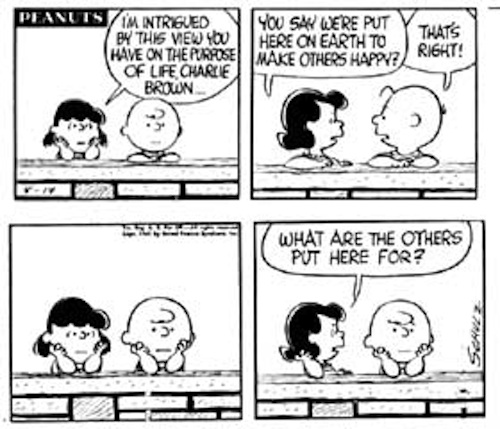First off, that’s not to say a nation that doesn’t celebrate Thanksgiving also doesn’t contain humans. It’s more a discussion of the core elements of Thanksgiving — thankfulness and gratitude — being far more than sentiment. Evolutionary biologists and philosophers use the term reciprocal altruism (here’s the Wiki). It seems odd on surface — the two primary goals of existence have long been defined as survival and reproduction, so you would assume that every human would be selfish almost all the time. But we know that humans have a capacity to help others; while news is often awful, we see this side of humanity every day. It’s legitimately “a moral maze.” Some other animals display reciprocal altruism — such as vampire bats, and types of birds and fish — but it’s fairly unique to humans in a broad sense. There are academic papers on this topic all over: see here, here, here and here for some examples.
This time of year always brings out media discussions of gratitude and giving back, paying it forward, etc. Some of the best this year are from E.J. Dionne, The New York Times (which actually lays out a plan for doing this year-round, instead of just one day), Daniel Newman (tying it to leadership), The Washington Times, NPR (with a depressing, albeit unique, spin), and Forbes. The two central ideas are (a) being grateful and showcasing gratitude can make you a better, stronger person (there are now studies tying it back to immune system health) and (b) while we tend to focus a lot of our efforts around gratitude during the Thanksgiving-to-Christmas season, we should consider instituting systems for showing others how grateful we are 365 days a year. (Some of that is discussed on the NYT and Newman links.)
(That video is a bit eerily religious, but it’s still kinda cool.)
If you Google around the idea of “Are humans naturally selfish?”, two of the best things you’ll find are from TIME and from Slate. Both discuss altruism as a critical — perhaps the critical — aspect of human nature; think about the selection of mates. While there is a common trope in pop culture (and for some, in their 20s) that girls like “bad boys,” in reality the evolution of mate selection usually required the male to be a cooperative hunter who valued the entire tribe — not just himself — to be attractive to the female. That pushed society forward. Then, there’s this, from that TIME article:
Moreover, our stress systems themselves seem to be designed to connect us to others. They calm down when we are feeling close to people we care about — whether related to us or not — and spike during isolation and loneliness. Even short periods of solitary confinement can derange the mind and damage the body because of the stress they create. And having no social support can be as destructive to health as cigarette smoking.
You can check out other resources on the idea here, here, here and here.
Twitter embraced the concept this week, of course:
How we can all bring the gratitude of Thanksgiving into our daily lives http://t.co/M8hYoHyFGr
— Arianna Huffington (@ariannahuff) November 27, 2013
The effects of gratitude on others, and how giving thanks can motivate and encourage http://t.co/cMiHvHD2vp
— Harvard University (@Harvard) November 28, 2013
https://twitter.com/twliterary/status/405932724499652608
I’ve used a lot of different terms in this post to explain the same concept — basically, “altruism” or “gratitude” or “reciprocal altruism” all essentially mean being thankful or giving back or having the ability to help others. If you go around and talk to people about what makes someone human — i.e. what separates a human from their evolutionary ancestors (I wouldn’t recommend this discussion at Thanksgiving dinner, per se) — most of the answers will revolve around higher-order thinking or the ability to walk on two legs. But the reality is even more than that: higher-order thinking and understanding are key elements, but the ability to feel compassion and pass that onto others is essential. I’m not nearly smart or well-versed enough to make this argument in the compelling fashion I’d like to, and I just got minimally distracted wondering why every male anchor on NBC News now has a beard (No-Shave November via a quick Google), but the point overall is … Thanksgiving is quite literally a celebration of what makes us uniquely human. There are a lot of tough aspects to it — travel, family drama, people cooking turkey with the giblets inside, et al — but at core, you’re celebrating the essence of what makes you who you are. Enjoy it.
